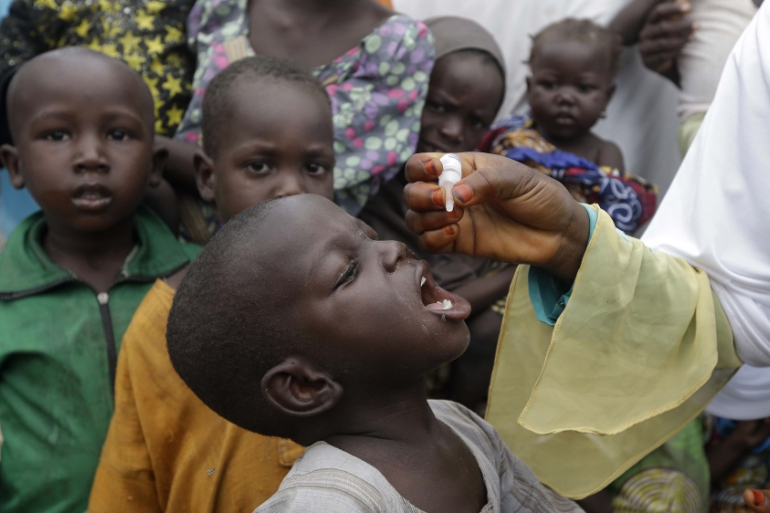Stop new polio infections now
There are growing health concerns in the country over the recent outbreak of circulating Vaccine Derived Poliovirus Type 2 (cVDPV2) in 13 states and the Federal Capital Territory (FCT). The Executive Director of the National Primary Healthcare Development Agency (NPHCDA), Dr Faisal Shuaib, announced on Monday, July 5, that the country is witnessing a cVDPV2 […]

File photo of polio vaccination
There are growing health concerns in the country over the recent outbreak of circulating Vaccine Derived Poliovirus Type 2 (cVDPV2) in 13 states and the Federal Capital Territory (FCT). The Executive Director of the National Primary Healthcare Development Agency (NPHCDA), Dr Faisal Shuaib, announced on Monday, July 5, that the country is witnessing a cVDPV2 outbreak in Abia, Bayelsa, Borno, Delta, FCT, Jigawa, Kano, Kebbi, Lagos, Niger, Rivers, Sokoto, Yobe and Zamfara states. Of great concern is the fact that some of the states where cVDPV2 is found were not among those that had the previous Wild Polio Virus (WPV). Dr Shuaib, thus alerted on the need for the country to jealously guard its WPV-free status and stop the cVDPV2 transmission in communities.
According to Dr Shuaib, the agency had conducted four Outbreak Responses (OBRs) using the Novelle Oral Polio Vaccine; adding that “sub-optimal performance has been recorded in all the states due to the high number of missed children during the exercise.”
- Woman, 4 kids killed in Zamfara airstrikes
- Buhari dines with N/Assembly members, vows to end insecurity
He lamented how donor funding for polio had reduced drastically and called on traditional rulers to continue to draw the attention of political leaders to properly fund polio outbreak response campaigns.
While the WPV is the most common form of poliovirus, cVDPV is another form that can spread fast in communities. As the name suggests, cVDPV2 is derived from the vaccine. In a child that is under-immunised, the vaccine virus can multiply and cause polio disease because of the low level of immunity in the child. When such a virus is transmitted from child to child within a community, it is called a cVDPV. Medical experts have warned that cVDPV is a threat to Nigeria’s wild polio virus-free status.
The outbreak of cVDPV2 surfaced barely one year after Nigeria was certified free of WPV by the Africa Regional Certification Commission (ARCC). Before the certification, Nigeria was the only WPV-endemic country in Africa. In 2012, the country accounted for more than half of all polio cases worldwide. The last case of WPV was detected in Nigeria in 2016. It would be recalled that in 2019 Nigeria marked three years after the last case of polio was recorded, which was also the last case documented in Africa. Nigeria is the last country in Africa where polio was witnessed, specifically in Borno State. Outside of Nigeria, the last case on the continent was recorded in Somalia in 2014.
Insurgency, particularly in the North East, as well as other forms of insecurity in other parts of the country, have had their impact on the regular conduct of immunisation. Besides preventing many children from assessing polio vaccination, the lockdown occasioned by the COVID-19 pandemic stalled the routine house-to-house polio campaign which further hindered effort to stop its transmission across affected countries. These disruptions consequently created a gap in immunisation coverage, leading to the spread of the cVDPV2 in Nigerian communities.
To avoid the spread of cVDPV2, therefore, there is an urgent need for public health officers to reach out and immunise all children in states where the cVDPV2 variant has been reported. The NPHCDA also needs to urgently collaborate with all stakeholders to revive and strengthen routine immunisation activities to avert the spread of cVDPV2 to other states in the country. These stakeholders include traditional, religious and community leaders. State governments that are currently denying its existence in their states despite official report of the presence should stop that immediately and instead collaborate with relevant parties to stop the spread.
It is not good enough to continue to solely rely on international donor agencies and organisations such as the Melinda and Gates Foundation for intervention on polio eradication. Indigenous philanthropists are encouraged to make polio eradication a priority in their charitable activities. We urge government to spare some attention from other national emergencies such as kidnapping and banditry for issues such as this to avoid escalation.
Unless the country is able to manage and quickly stop the spread of this new infection, Nigeria risks losing its wild polio-free status and years of rigorous effort made to kick polio out of Nigeria would have been wasted. Besides maintaining strong disease surveillance, public health experts affirm that the best protection against all types of polio, including cVDPV2, is to ensure that all children are vaccinated in routine and supplementary immunisation campaigns, and that the government and other stakeholders should ensure that is done.
